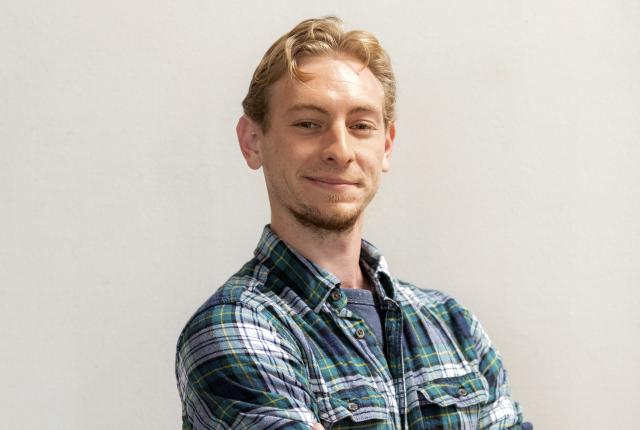Above: The doors to Silver City’s first makerspace were barely open when the news of a global pandemic arrived and Stephen Lindsey had to adjust. Photograph by Gabriella Marks.
STEPHEN LINDSEY WAS IN A TIGHT SPOT. The doors to Silver City’s first makerspace were barely open when the news arrived. “We had no idea we’d be shutting them six weeks later due to a global pandemic,” Lindsey says.
He thought it might be the end of the newly created Future Forge. Lindsey and his partners, Gabe Farley and Mary Stone, had invested about $45,000 of grants, donations, and private funds into eight 3D printers, a laser cutter, a vinyl cutter, supplies, and tools. They’d signed up about a dozen members before launching but now couldn’t charge them. He remembers thinking, How are we going to stay alive?
Born in San Diego, Lindsey moved at age six with his parents to rural New Mexico, near his mother’s family. They lived on a 60-acre ranch in Cliff, a tiny town abutting the Gila National Forest northwest of Silver City. The shift from city to farm life was a big one. Both of his parents worked, and their home was too remote for a school bus to reach. That left Lindsey and his older siblings to homeschool themselves, with occasional check-ins from their parents and grandparents.
“It was great,” Lindsey says. “I could just sit and read all day and learn what I was interested in.” The freedom allowed him to form an independent worldview and fostered a keen interest in how innovation could help society.
The makerspace idea began around 2018, in the Silver City computer repair shop where Farley worked. Lindsey, who’d recently left his career as a solar installer, was looking for a new direction. He bought an affordable 3D printer to start a tiny business in the back of the shop, with plans to include more technologies. “A makerspace is a means for a community to be more resilient,” Lindsey says.
"More than half of the equipment we received was given to the health center, where our doctor and the nurses are. I know they made good use of it."
When the pandemic shut down Future Forge, Lindsey quickly shifted its focus. Along with a team of volunteers, he began running the eight 3D printers nonstop to make brims for face shields. The local community soon learned what they were doing and began supporting the efforts, donating $8,000 in the first month. This allowed Future Forge to make and donate personal protective equipment (PPE) to medical facilities for almost a year and a half—“over 5,000 medical gowns, over 2,800 face shields, and about 1,000 masks,” says Lindsey.
The Unitarian Universalist Fellowship of Silver City received thousands of PPE units from Future Forge and distributed the supplies to other organizations, including Border Partners. The Deming nonprofit helps people in need at the U.S.–Mexico border and works closely with a small healthcare center located in Palomas, Mexico, that serves 40 to 50 seniors per month, as well as a handful of other patients.
“More than half of the equipment we received was given to the health center, where our doctor and the nurses are,” says Border Partners general manager Melissa Reyes. “I know they made good use of it.”
Future Forge has thrived since semi-normal operations resumed in June, even increasing the community space to 12,000 square feet. “We’re planning to host classes and workshops in the late spring or summer,” Lindsey says.
True Heroes
Read more about the 10 individuals who went above and beyond to support our communities.


